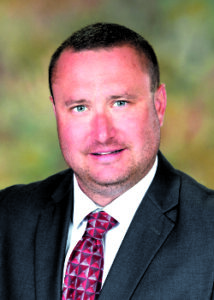SOBE Energy loses $468,000 federal suit
Heating, cooling firm also is accused of passing bad check
YOUNGSTOWN – SOBE Thermal Energy Systems LLC, the company seeking to convert rubber tire chips into synthetic gas at its Youngstown facility, lost a $468,000 lawsuit for failing to pay for equipment and is facing a separate lawsuit from a business alleging SOBE’s $400,000 check bounced.
Meanwhile, SOBE’s law firm — Vorys, Sater, Seymour and Pease of Columbus — in an Ohio Environmental Review Appeals Commission case filed by the city of Youngstown against the company and Anne Vogel, Ohio Environmental Protection Agency director, asked July 15 to withdraw from the case. Law firms typically seek to leave cases because they’re not being paid by their clients.
David Ferro, SOBE’s CEO, could not be reached Thursday to comment.
Wabash Power Equipment Co. of Wheeling, Illinois, filed a federal lawsuit in Illinois on Nov. 29, 2024, against SOBE saying the latter breached an equipment lease agreement at SOBE’s Youngstown facility, 205 North Ave. SOBE signed the two-year lease in November 2019 to use a mobile steam plant at $19,500 a month.
A federal judge ruled Jan. 29 in favor of Wabash’s motion for default judgment and issued a final judgment in its favor for $468,000.
Wabash filed a May 23 motion in Mahoning County Common Pleas Court to repossess and remove the equipment after SOBE refused many demands for the property, according to court documents.
Mahoning County Common Pleas Court Judge Anthony Donofrio on June 10 ordered the sheriff’s department to seize the property and deliver it to Wabash.Meanwhile, Alcon Mechanical Piping Inc. of Niles on July 19 filed a complaint against SOBE for nonpayment for the January 2024 installation of piping at two downtown businesses that receive steam heat from SOBE on behalf of that company.
The lawsuit contends on Sept. 20, 2024, that Ferro “delivered a check to plaintiff in the amount of $400,000 and was deliberately obtuse and evasive as to whether or not the check could be cashed.”
When the check was cashed Feb. 18, the lawsuit claims it was returned for insufficient funds.
Alcon sent a letter to SOBE on April 17 saying it would sue for “passing of bad checks,” and SOBE “has not responded to this demand in any meaningful respect,” according to the lawsuit.
Alcon is suing for $428,458, including compensatory damages.
CITY COUNCIL VOTE
Youngstown City Council is being asked at its Monday meeting to permit the board of control to spend up to $30,000 for a second expert witness in its ongoing effort to stop SOBE’s proposal to convert rubber tire chips into synthetic gas at its facility near downtown.
The $30,000 would be to pay JD Gibbs, associate director of consulting at BSI Group in Columbus, an environmental services expert with 33 years of experience.
The board hired Ranajit (Ron) Sahu of Alhambra, California, in a 3-0 vote on March 13 to provide testimony in front of the Ohio Environmental Review Appeals Commission in the case filed against SOBE and Vogel.
The Ohio EPA issued a permit on Feb. 14, 2024, for SOBE to move ahead with its plans to use pyrolysis, which is the gasification or combustion of tires, chipped tires, plastics and electronic waste into synthetic gas at its Youngstown plant. A draft permit was issued July 6, 2023.
The city objects to the permit and filed an appeal March 15, 2024, stating Vogel’s decision to issue a final permit “is unreasonable and lacking a valid factual foundation, and / or unlawful and not in accordance with state law.” The city asked the commission to order Vogel to revoke the permit.
The hearing is scheduled to start Nov. 17.
Michael Verich of Howland, a former state representative, is vice chairman of the three-member commission.
Ferro said last year that the company plans to only use shredded tires and it would be “very clean with zero hazardous waste and zero hazardous emissions.”
The gas would be used for steam energy for downtown businesses as well as sold to companies for other purposes.
The Ohio EPA issued an “air permit to install and operate” to SOBE to shred tires that would be converted into gas at its Youngstown plant over numerous objections from city officials and residents.
City council on Nov. 20 approved a second one-year moratorium on the process SOBE plans to use at its plant. Council members say the process is dangerous, untested and harmful to the environment. They also said they don’t plan to ever lift the moratorium that was initially passed Dec. 20, 2023.
City officials repeatedly have said the project needs approval from Youngstown for a zoning change to move forward, and they oppose that.
Opponents of the project have said the synthetic gas is toxic and a highly explosive hazardous material and that air emissions would threaten public health. Nearly 100 people attended an Aug. 10, 2023, public hearing to express opposition to the EPA granting the permit to SOBE.
The EPA stated Feb. 14, 2024, that it would allow SOBE to install a “thermolyzer unit to process tire chips. The unit will produce a synthetic gas that would serve as a supplemental fuel in two existing natural gas-fire boilers that are already installed, operated and permitted. The permit does meet the applicable Ohio environmental rules and regulations so Ohio EPA is obligated to issue a permit.”
John Mooney, director of the federal EPA’s air and radiation division for the region that includes Ohio, sent a Sept. 11, 2023, letter to the state EPA writing the federal agency “determined that the draft permitting action raises potential environmental justice concerns,” and that he urged the state to not grant the permit.
“The introduction of a thermolyzer within a residential and downtown setting stands fundamentally at odds with both the prevailing zoning laws and the principles of environmental justice,” Mooney wrote.
SOBE has more than 40 heating and cooling customers in the downtown area.
Based in Dublin, Ohio, SOBE acquired the former Youngstown Thermal LLC and Youngstown Thermal Cooling LLC in November 2021 for $250,000. The company had managed the facility for two years prior.
Before taking over, Youngstown Thermal had numerous problems for years operating its cooling system – leaving the handful of downtown businesses that used it without air conditioning during the summer.
Youngstown Thermal was placed into receivership in 2017 after the Public Utilities Commission of Ohio was informed by the company’s former CEO that the business had financial struggles that could have caused an energy crisis downtown. Youngstown Thermal couldn’t ensure adequate service to its customers and was in danger of insolvency when the PUCO stepped in.
Youngstown Thermal is the oldest district heating and cooling system in the country, having begun operations in 1895. It was designed to generate and distribute steam to heat downtown businesses using coal as its main source of fuel.





